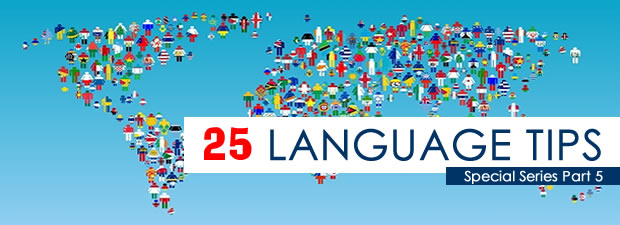Don’t blindly accept changes…

8. Don’t blindly accept changes by your translation reviewers
When your company attempts to do business in other countries, its credibility is on the line with every translated legal, technical and marketing document you distribute. Prospective purchasers and end users know when your translations don’t “feel right.” And the first impression your documents make for you is even worse when they contain obvious errors in vocabulary, idioms, grammar, and style.
The thought quite naturally arises in the minds of prospects, “Does this company really know what it’s doing? If its technical and marketing materials are translated this poorly, how can we trust the quality of its products and customer support?” Then, with your credibility undermined, they stop paying any serious attention to your actual marketing message.
The best professional language agencies avoid this possibility by using a multi-step process to ensure accuracy. First the main translator – a native speaker with a graduate or advanced degree in Translating, many years’ experience, and expertise in your industry terminology – does the initial translation. This is then read and edited by a second translator who is equally well qualified, to catch any errors or omissions the first translator might have made. Finally, the edited translation is proofread for spelling, punctuation, grammar, numbering, formatting, etc. This process ensures that your translated materials will “go down easy” with your target audience. And that opens the door to their remaining interested in your actual message.
Some firms try to save money by going with a one-step process using only a single translator, with the editing and proofreading steps left to overseas agents or distributors. Other companies may ask their agents or distributors to do a final review of your deliveries. Superficially this may seem like a clever way to control costs or to verify our accuracy. But it can be a huge mistake, especially when companies blindly accept their reviewers’ changes.
This is no knock on your overseas associates. They may be outstanding at their primary jobs, but they are not professional linguists. You have no guarantee that they can write properly, spell properly, or know correct grammar and style in their native languages. And, if you don’t have their work checked by outside certified professionals, how would you ever know ?
Here are some real-life examples of what can happen:
- A Vietnamese employee of one of our clients rewrote our translation in her village dialect, which was not the educated, standard Vietnamese that our client wanted to convey to establish its image in the business community there.
- An overseas agent of another client changed the translation of “motor oil” to “salad oil.” This error would seem impossible to make in English, but in other languages many words do not translate directly, and nuances come into play.
- An industrial saw company had us translate its brochure into Spanish. Then it asked its bilingual employee to review our translation before it went to print. When the company’s Mexican distributor received the printed brochures, he complained that the Spanish was absolutely terrible and full of gibberish. It turned out that the employee who made edits was a worker in the company’s warehouse and had no more than a fourth-grade education, even in Spanish.
- A large medical manufacturer had us translate its “Directions for Use” into 12 European languages. The company then asked their European agents to review our work. Our client returned their edits to us for final evaluation. We discovered their Danish agent had added a claim that the home office knew nothing about, and for which the company would have been liable had the document been printed and distributed.
Your company’s image, reputation, and liability exposure are on the line every time you have any of your documents translated into another language. Therefore, it’s crucial to catch these kinds of errors and alterations before it’s too late. The cost of doing so is not really a current expense. It’s an insurance policy and an investment in your future profitability. So, whenever you need anything translated, your best option is to have us do your whole job, using professional linguists implementing our three-step “best practices” procedure.
Of course, we welcome your agents’ input regarding specific terminology and in-house practices. But If your reviewers make any changes to our work, please always send them back to us for a final critique. We can then advise you when their edits become rewrites that do not match your original intention, or that fail to support your company’s brand consistency and quality image.
For more information on this important issue, be sure to get our special report, How to Do a Translation Review, which provides guidelines for acceptable and unacceptable changes (such as rewriting the translation so that it no longer resembles the source original).
To obtain this report click here.
[box type=”info”] JUST FOR LAUGHS!
Sign in China –
Holding funeral rite is an old custom when the people dead. Today, most people enjoy modern custom.
